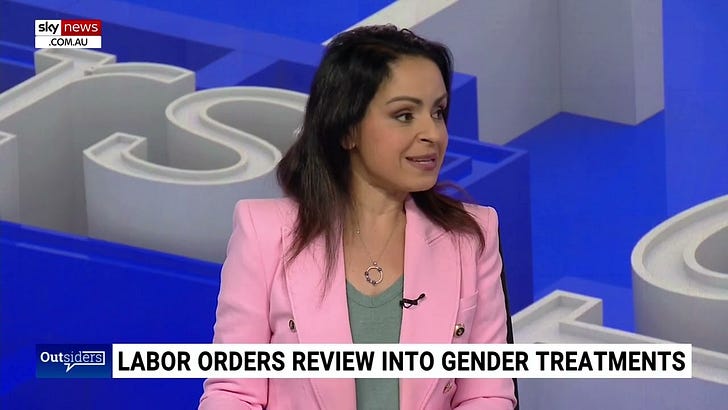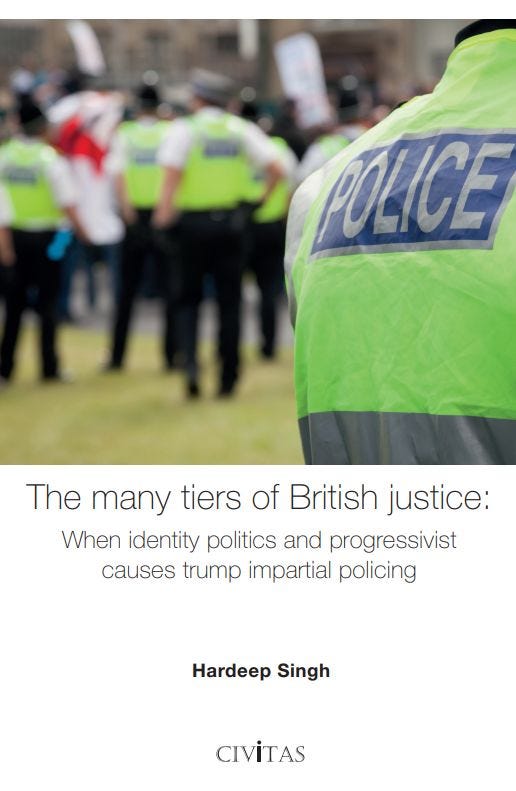Lots of news and views still pouring in to Dusty Towers, dear readers, so this is another two parter.
We are still in Terf Month ( to counteract Queer Month) and we are featuring great speeches on the theme of women’s rights. Thanks to those readers who have already sent in great suggestions.
When my wife and I peaked in 2019, one of the earliest people we followed was the wonderful Rita Panahi on Sky News Australia. We are still following her! Go, Rita!
I am very grateful to all my subscribers but only 3% of my subscribers are paid. It actually takes a lot of work to put together these updates, so I would greatly appreciate it if you could consider becoming a paid subscriber or else make a donation via ‘buy me a coffee.’ Great discussions take place in the comments, so please get involved in those.
Thanks to two wonderful readers for suggested pieces.
Some of the linked pieces below may be behind a paywall.
The Disastrous Effects Of Oestrogen
EDI Jester looks at a piece from Colin Wright on his substack, Reality’s Last Stand concerning a new report on the disastrous effects of oestrogen on boys and men.
Colin Wright’s piece is here:
Drag Queens And Pride In School
Despite the welcome drop in support for Pride this month, there is still evidence of Pride being involved in schools in England. On her substack, Joanna Williams argues that drag queens and Pride should not be in schools at all. Hear, hear.
Drag queens do not belong in schools
Children should not be celebrating Pride month
Jun 25, 2025

June is Pride month but this year’s festivities are notably more subdued than in the recent past. The election of President Trump in the US and increased questioning of the effectiveness of Diversity, Equity and Inclusion initiatives has led to a notable fall in corporate sponsorship. There are certainly still Pride flags on display in my local high street but the rainbow is nowhere near as ubiquitous as it was just 12-months ago.
Sadly, it seems that some schools are yet to catch up. Many are still ‘embracing Pride month’ and proudly flying the Pride flag. Spare a thought for the children of Swindon and Wiltshire: there, primary school pupils are being taught about 300 different LGBT pride flags and the sexualities and gender identities behind each of them (mercifully, only 29 in detail). Park Grove Primary School in York has rebranded its early years centre (for children aged between 3 and 5) as the ‘Rainbow Hub’. The tiny tots painted rainbow flags and held a ‘themed party’ involving parents. Although the ‘rebranding’ had been planned for a while, the leader of the early years centre said, ‘It linked in really nicely with York Pride, which we're proud to be a part of as well.’
The full piece is here:
https://cieo.substack.com/p/drag-queens-do-not-belong-in-schools
The For Women Scotland Judgment - The Aftermath
Andrew Doyle on his substack argues that, following the judgment, the actions of the trans rights activists are showing everyone exactly who they are and what they stand for - and it’s not a good look!! All thoughts gratefully received.
https://www.andrewdoyle.org/p/trans-activists-are-getting-desperate
On his substack, James Esses looks at how Kent County Council have so far failed to take any steps to implement the judgment.
The Council Ignoring the Supreme Court
Welcome to Kent County Council
Jun 27, 2025
It is now well over 2 months since the seismic Supreme Court judgment, which ruled that the meaning of ‘sex’ under law is biological in nature.
However, it is becoming increasingly apparent that various public bodies are seeking to ignore or even disregard the judgment altogether, even if it means they are breaking the law.
Today, I can reveal, exclusively, one of the culprits - Kent County Council (KCC).
A few weeks ago, I was contacted by a whistleblower who works for the Council.
I was told:
"As an employee of Kent County Council, I find the torrent of LGBTQ+ material forced upon us during pride month incredibly alienating. Gender ideology is a highly controversial but also highly contested topic, of which many of my colleagues and I do not subscribe to. The guidance presented to us is not only factually inaccurate, subjective, but also contravenes several updated legal positions such as the Supreme Court judgment, the Cass Review and Forstater ruling. It appears that local government have forgotten that there are nine protected characteristics and is clear that any freedom of speech and freedom of thought is not to be tolerated."
My whistleblower leaked a multitude of internal training documents and policies that, crucially, are still in force as of today’s date, in complete and utter disregard of the Supreme Court judgment.
The full piece is here:
UK - Two Tier Justice
The current Labour Government have been accused for some time now of ‘two tier justice.’ On The Academy Of Ideas substack, Baroness Claire Fox discusses a report from Hardeep Singh, deputy director of the Network of Sikh Organisations. Albeit that this report is not specifically about gender ideology, the question of two tier justice is extremely relevant to us Terfs.
The many tiers of British justice
Civitas has just published an invaluable report on how identity politics and progressivist causes are undermining the impartiality of our criminal-justice system.
Jun 26, 2025
Civitas has just published a new report by Hardeep Singh, The Many Tiers of British Justice: When identity politics and progressivist causes trump impartial policing. Hardeep is a freelance journalist, deputy director of the Network of Sikh Organisations and assistant editor of The Sikh Messenger. The report is hugely important, and I was very happy to provide a foreword for it, which is reproduced below.
You can download the report from the Civitas website.
On 5 March this year, the Sentencing Council – an unelected quango set up in the Gordon Brown era – published the revised Imposition of community and custodial sentences sentencing guideline, which was due to come into force on 1 April.
The revised guideline states: ‘When considering a community or custodial sentence, the court must request and consider a pre-sentence report (PSR) before forming an opinion of the sentence’, and that a PSR ‘will normally be considered necessary if the offender belongs to one (or more) of the following cohorts’, which includes those ‘from an ethnic minority, cultural minority, and/ or faith minority community’. [ Dusty - it also included ‘transgender people’].
Justifying this change, the Sentencing Council said the quiet bit out loud, admitting its aim was to help address racial and other disparities in outcomes in the criminal-justice system. In other words, it moved from its dispassionate, impartial role of sentencing advice, based on judicial fairness, to a politicised attempt at manipulating sentencing outcomes to fix its perception of ‘institutional racism’.
There was a huge backlash against this blatant racialising of criminal justice that would – in effect – mean that minority defendants would be far less likely to serve custodial sentences for the same offences. It shouldn’t surprise us that the public were horrified by proposals that were such a blatant slap across the face of impartial justice. Perhaps more surprisingly, however, one of the most vociferous critics of the guideline was the justice secretary, Shabana Mahmood. She was uncompromising when stating on X: ‘As someone who is from an ethnic minority background myself, I do not stand for any differential treatment before the law.’ She went on to vociferously oppose a ‘two-tier sentencing approach’.
That mention of ‘two-tier’ justice from a government minister is important. After all, over the past year – specifically in the wake of the civil disturbances following the stabbings in Southport in 2024 – any mention of the phrase has been sneeringly dismissed as a far-right conspiracy theory. One article in the Guardian was titled ‘England riots: how has “two-tier policing” myth become widespread?’. Metropolitan Police Commissioner Sir Mark Rowley described ideas of two-tier policing as ‘complete nonsense’. In April 2025, the Home Affairs Committee Inquiry into the 2024 riots doubled down, talking about ‘Unsubstantiated and “disgraceful” claims of “two-tier policing”’, which have ‘served only to undermine police officers’. Yet now, the government has been forced to introduce new emergency legislation – the Sentencing Guidelines (Pre-sentence Reports) Bill – precisely to ensure that two-tier justice doesn’t become embedded in the system.
Hardeep Singh’s report is an invaluable record of why this all matters. It is rich in detail and doesn’t flinch from complexity and nuance. It’s important we understand this two-tier phenomenon beyond the phrase, which is fast becoming a meme-like cliché, either used as an insult to denote ‘far-right’ adjacent wrong-think or a short-cut slogan to signify distrust in the establishment.
At its heart is the story of rot at the heart of criminal justice, and state institutions more generally. Under the guise of ‘diversity is our strength’, we are in danger of allowing police impartiality to be fatally compromised and a divisive, identitarian ideology to shatter the public’s belief in even the possibility of the state’s ability to treat everyone equally under the law.
While reading Hardeep Singh’s substantial investigation into the underlying causes of the riots and the arguably one-sided responses from the police, the Crown Prosecution Service and media commentators to the riots in the summer of 2024, I could feel my blood pressure rising. Indeed, my blood was boiling at the injustice of it all, especially reading sections dealing with government blind spots in relation to, for example, the white working class versus the counter-protestors, or the differential custodial sentences doled out for some social-media posts, but not others. ‘Thank goodness this is being documented’, I reflected. In our rapidly changing world, with so much extraordinary news being created daily, it can be too easy to forget details. And we should not forget.
But even more invaluably, the report helpfully creates a broader context. So much is covered: the ‘non-crime hate incident’ phenomenon; the Black Lives Matter and Edward Colston protests; the pro-Palestinian demonstrations since the 7 October attack by Hamas; and other examples of civil disorder, including at Manchester Airport, Harehills (Leeds) and the Notting Hill Carnival. It knits together a series of threads to reveal a fully formed garment that all policymakers, legislators, journalists and activists should read to help make sense of seemingly disparate phenomena.
Inevitably, the issue of ‘grooming gangs’ features in the report. I write this foreword in the aftermath of a furore about Lucy Powell, Labour’s leader of the House of Commons, making controversial remarks during BBC Radio 4’s Any Questions? about a Channel 4 documentary, Groomed: A National Scandal, which detailed shocking accounts from victims of sexual exploitation. Powell’s retort, ‘Oh, we want to blow that little trumpet now, do we? Let’s get that dog whistle out, shall we?’ is likely to join the history book of infamy, alongside Gordon Brown’s ‘bigoted woman’ slur. Too often, identity politics are used to demonise opponents and shut down debate.
The full piece is here:
Scotland - Police Searches
Just as you think that nothing more in the Gender Wars can shock you….
Feminist Legal Clinic report:
Police rules for trans body searches are ‘botched compromise’ (27 June)
New Police Scotland guidelines which allow transgender suspects to request officers of different sexes to frisk various parts of their body have been described as a “botched compromise”.
The advice — designed to accommodate people who have not completed a full surgical transition — would mean detainees could ask for a woman to search their top half and a man to search below the waist.
The human rights charity Sex Matters has warned that the “new rule is a gift to any suspect who may get satisfaction or enjoyment from being disruptive”.
Source: https://www.thetimes.com/uk/scotland/article/transgender-police-scotland-sex-gender-searches-supreme-court-l6s29h8m6?
https://feministlegal.org/police-rules-for-trans-body-searches-are-botched-compromise-the-times/
The States - Chase Strangio
Chase Strangio is the larping female advocate who represented the American Civil Liberties Union in the recent Skrmetti case ( see recent updates for lots of discussion about this marvellous judgment). Leanne Owen on the LGB Courage Coalition substack explains how Ms Strangio seems more intent on undermining the American system of justice!
Chase Strangio and the Death Spiral of Gender Ideology
Jun 25, 2025
By the time Chase Strangio stood before the Supreme Court in Skrmetti v. United States, she was no longer just a lawyer arguing a case—she was the embodiment of a movement that had traded evidence for identity, public consensus for ideological purity, and legal strategy for cultural warfare.
Her story is not one of civil rights expansion, but of institutional capture, medical overreach, and political self-sabotage. Strangio, a trans-identified female and ACLU attorney, helped transform the American transgender movement from a marginal cause into a dominant elite consensus in just under a decade—only to drive it into catastrophic backlash by refusing to engage with basic biological reality or democratic legitimacy.
A Lawyer Who Doesn’t Believe in Law
Strangio has proudly described herself as “a constitutional lawyer who fundamentally doesn’t believe in the Constitution.” She doesn’t mean it metaphorically. In her view, the American legal system is not something to navigate or improve—it is something to dismantle. And that radical posture has shaped the trans movement’s most consequential legal strategies, with disastrous results.
She rejects the concept of biological sex entirely, insisting that there’s “no such thing as a male body” and that a penis is “just an unusual body part for a woman.” She fought to block trans advocacy ads that referred to transwomen as “born male,” calling even that language too compromising. She demanded full affirmation of gender identity as innate, infallible, and beyond question—ideological absolutes that alienated the very public she claimed to represent.
This kind of rhetoric might win likes on social media, but it collapses in a courtroom. And that’s exactly what happened. Before the Supreme Court, Strangio was forced to retreat: admitting there’s no evidence that these treatments reduce suicide, using the phrase “born male,” and watching the case fall apart under cross-examination from justices who had no patience for activist slogans dressed up as legal arguments.
The full piece is here:
https://substack.com/home/post/p-166777830
Emotionalism Undermining Law
On the Selsey Substack, Jerome Lloyd argues that ‘emotionalism discourages critical thought and the virtues of citizenship. Public reasoning is replaced by slogans, therapeutic mantras, and reactive policymaking, rendering society less capable of handling complex moral and social questions.’
I like this argument but I think it is in danger of depicting us Terfs ( for example) as cold blooded automatons who don’t engage with emotion at all. I would prefer to re-phrase it and say that you cannot ( or should not be able to) win an argument based solely on what Jerome calls ‘emotionalism.’ You can feel great empathy for Riley Gaines being defeated by Lia Thomas (in fact I don’t think I would be a campaigner on this issue at all if I didn’t feel empathy!) but we have to then go beyond that and explain why the power and strength of Thomas as a man gave him enormous unfair advantage over the women competitors. All thoughts gratefully received.
The Rule of Felling: How Emotionalism Is Undermining Law and Public Reason
When feeling becomes law, justice falters.
Jun 25, 2025
A marked feature of contemporary political discourse is the increasing prominence of emotionalism—the prioritisation of subjective feeling over objective reasoning—in shaping law and public policy. While empathy and moral awareness are essential in any humane society, the over-reliance on emotional appeals raises concerns about the coherence, stability, and justice of resulting legislation, particularly in areas requiring ethical nuance and long-term foresight.
Emotionalism, in this context, refers to the dominance of affective responses—such as compassion, outrage, or personal testimony—over empirical evidence, ethical reasoning, and consistent legal principle. In recent years, this tendency has become especially evident in debates over abortion, assisted suicide, gender identity, immigration, and education.
The full piece is here:
https://substack.com/home/post/p-166823510
Endpieces
I am splitting the endpieces between the two parts.
From Tenaciously
#BeMorePorcupine
#LiesAreNotFreedom
#AdultHumanFemale
#LetWomenSpeak
#LGB✂️TQ
#JoinFreeSpeechUnion
#DontTransKids
#TRAsRewriteHistory
#NeverSurrender
#NeverForget
#TruthWillTriumph
#WeWillWin







Scottish Police seem to have opened the door to a fetishists heaven.
Great two parter, Dusty. I share Jerome’s concern about emotionalism; when it comes to some issues, parliament turns into an X Factor-like performance of sad life stories with little debate of substance. I think you make an important point, though, that we don’t want to be emotionless automatons either! In fact, I’m just as concerned about a lot of laws being the result of utilitarian calculations and cold academic theories behind the scenes, even if it’s played out with emotional theatrics once it gets to the public stage.